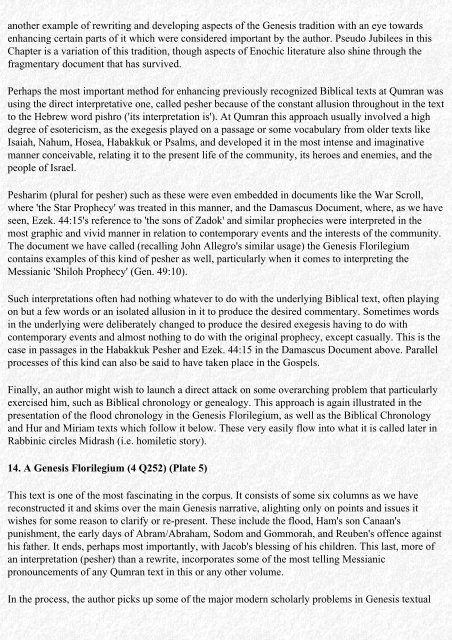Dead Sea Scrolls Uncovered - The Preterist Archive
Dead Sea Scrolls Uncovered - The Preterist Archive
Dead Sea Scrolls Uncovered - The Preterist Archive
You also want an ePaper? Increase the reach of your titles
YUMPU automatically turns print PDFs into web optimized ePapers that Google loves.
another example of rewriting and developing aspects of the Genesis tradition with an eye towards<br />
enhancing certain parts of it which were considered important by the author. Pseudo Jubilees in this<br />
Chapter is a variation of this tradition, though aspects of Enochic literature also shine through the<br />
fragmentary document that has survived.<br />
Perhaps the most important method for enhancing previously recognized Biblical texts at Qumran was<br />
using the direct interpretative one, called pesher because of the constant allusion throughout in the text<br />
to the Hebrew word pishro ('its interpretation is'). At Qumran this approach usually involved a high<br />
degree of esotericism, as the exegesis played on a passage or some vocabulary from older texts like<br />
Isaiah, Nahum, Hosea, Habakkuk or Psalms, and developed it in the most intense and imaginative<br />
manner conceivable, relating it to the present life of the community, its heroes and enemies, and the<br />
people of Israel.<br />
Pesharim (plural for pesher) such as these were even embedded in documents like the War Scroll,<br />
where 'the Star Prophecy' was treated in this manner, and the Damascus Document, where, as we have<br />
seen, Ezek. 44:15's reference to 'the sons of Zadok' and similar prophecies were interpreted in the<br />
most graphic and vivid manner in relation to contemporary events and the interests of the community.<br />
<strong>The</strong> document we have called (recalling John Allegro's similar usage) the Genesis Florilegium<br />
contains examples of this kind of pesher as well, particularly when it comes to interpreting the<br />
Messianic 'Shiloh Prophecy' (Gen. 49:10).<br />
Such interpretations often had nothing whatever to do with the underlying Biblical text, often playing<br />
on but a few words or an isolated allusion in it to produce the desired commentary. Sometimes words<br />
in the underlying were deliberately changed to produce the desired exegesis having to do with<br />
contemporary events and almost nothing to do with the original prophecy, except casually. This is the<br />
case in passages in the Habakkuk Pesher and Ezek. 44:15 in the Damascus Document above. Parallel<br />
processes of this kind can also be said to have taken place in the Gospels.<br />
Finally, an author might wish to launch a direct attack on some overarching problem that particularly<br />
exercised him, such as Biblical chronology or genealogy. This approach is again illustrated in the<br />
presentation of the flood chronology in the Genesis Florilegium, as well as the Biblical Chronology<br />
and Hur and Miriam texts which follow it below. <strong>The</strong>se very easily flow into what it is called later in<br />
Rabbinic circles Midrash (i.e. homiletic story).<br />
14. A Genesis Florilegium (4 Q252) (Plate 5)<br />
This text is one of the most fascinating in the corpus. It consists of some six columns as we have<br />
reconstructed it and skims over the main Genesis narrative, alighting only on points and issues it<br />
wishes for some reason to clarify or re-present. <strong>The</strong>se include the flood, Ham's son Canaan's<br />
punishment, the early days of Abram/Abraham, Sodom and Gommorah, and Reuben's offence against<br />
his father. It ends, perhaps most importantly, with Jacob's blessing of his children. This last, more of<br />
an interpretation (pesher) than a rewrite, incorporates some of the most telling Messianic<br />
pronouncements of any Qumran text in this or any other volume.<br />
In the process, the author picks up some of the major modern scholarly problems in Genesis textual

















